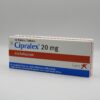
Cilate (20mg tablet x 30)
$22.80
Cilate (20mg tablet) is a medication commonly prescribed by healthcare professionals. It belongs to a specific class of drugs and is typically used for the treatment of certain medical conditions. It’s important to follow the prescribed dosage and any instructions provided by your doctor or pharmacist when taking Cilate. As with any medication, potential side effects and interactions with other drugs should be discussed with a medical professional before use.
Citalopram is an antidepressant medication used to treat depression and certain anxiety disorders. It belongs to the selective serotonin reuptake inhibitor (SSRI) class of drugs. The brand name you mentioned, Cilate, appears to be a fictional or less-known brand, but the active ingredient is citalopram.
Dosage and Administration:
- Dosage: Cilate (citalopram) is typically available in various strengths, with 20 mg being a common dose. The initial recommended dose for adults in the treatment of depression is usually 20 mg once a day. Your doctor might adjust this dose based on your response to the medication.
- Usage: Citalopram tablets can be taken with or without food. It’s usually recommended to take it at the same time each day to help you remember. It’s important to follow your doctor’s instructions carefully.
- Duration: It might take a few weeks before the full benefits of citalopram are felt. It’s important to continue taking the medication even if you don’t notice immediate improvements, unless your doctor advises otherwise.
Possible Side Effects:
Citalopram, like other antidepressants, can have side effects. Common side effects include:
- Nausea
- Dry mouth
- Sweating
- Drowsiness or insomnia
- Increased or decreased appetite
- Changes in sexual desire or ability
- Shakiness
- Serious side effects are rare but can include allergic reactions, serotonin syndrome (a potentially life-threatening condition characterized by agitation, hallucinations, rapid heartbeat, fever, muscle stiffness, and more), and changes in heart rhythm.
It’s important to report any unusual or severe symptoms to your doctor.
Precautions:
- Inform your doctor of any other medications, supplements, or herbal products you are taking, as citalopram can interact with certain substances.
- Pregnancy and Breastfeeding: Citalopram should be used cautiously during pregnancy and breastfeeding. The potential benefits and risks should be discussed with your doctor.
- Medical Conditions: Inform your doctor of any pre-existing medical conditions, especially bleeding disorders, liver disease, kidney disease, heart problems, and history of seizures.
- Discontinuation: Do not stop taking citalopram abruptly. Your doctor will provide guidance on how to gradually reduce the dose to prevent withdrawal symptoms.
Remember, only a medical professional can provide accurate dosage instructions and advice tailored to your individual circumstances. Always follow your doctor’s guidance and never hesitate to ask questions or express concerns about your medication.
| Weight | 0.06 kg |
|---|---|
| Dimensions | 3 × 3 × 1 cm |
Related products
Cipralex is a medication in tablet form that contains the active ingredient escitalopram. It is commonly used to treat depression and anxiety disorders. Escitalopram works by increasing the levels of serotonin in the brain, which helps regulate mood and reduce anxiety. Cipralex is typically taken once daily and may take several weeks to reach its full effect. It is important to take this medication exactly as prescribed by a healthcare professional, and to report any side effects or concerns to them promptly.



